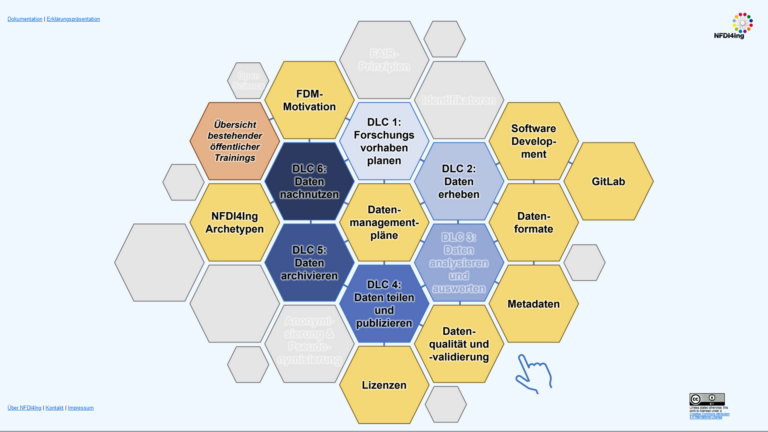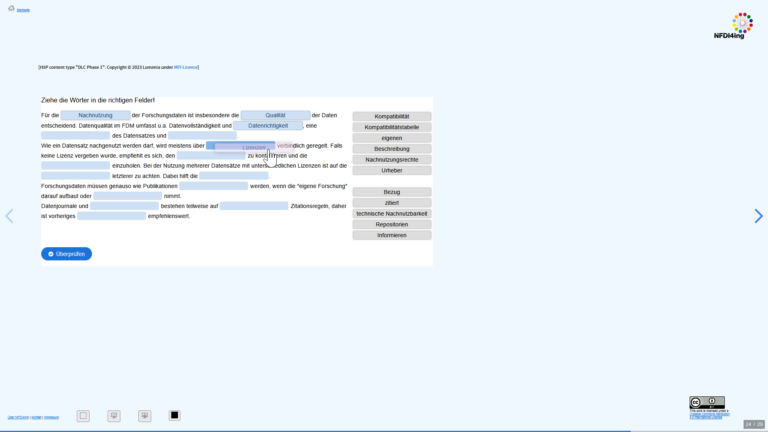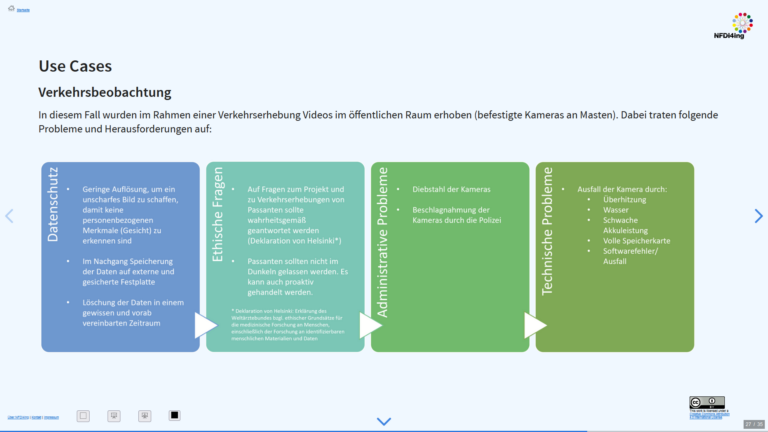Detailed description of the service
Basic RDM Training for Engineers is a key initiative within NFDI4Ing designed to provide comprehensive training resources for research data management (RDM) specifically tailored to the needs of the engineering disciplines. Its primary goal is to help researchers navigate in data-driven environments by offering access to both basic and specialized training materials. These resources target the unique challenges encountered in engineering research, for instance RDM within engineering research projects comprising large data sets.
The service supports engineers by focusing on two core areas:
Research Data Process: This area covers the entire data life cycle (DLC) —from data management planning to data reuse. They include guidance on the use of technologies and tools, and best practices for handling data through research processes like metadata creation, licenses, data publication, among others.
Cross-topic modules: Across multiple DLC phases, these trainings include approaches for effective data planning, insights into RDM workflows, and maintaining data quality. By addressing both the technical and organizational aspects, the service ensures a holistic approach to RDM.
The service Basic RDM Training for Engineers is highly community-driven, engaging researchers through continuous feedback via a digital form as well as personally in a special interest group (SIG) format. It also adapts to evolving needs through an ongoing requirements analysis to ensure training materials are relevant, practical, and up to date. This way it is ensured that the trainings stay up-to-date and that interested community member can contribute, e.g. with illustrative use case examples from the engineering sciences. All resources are developed in collaboration with local RDM units and NFDI4Ing partners at engineering research institutions, ensuring they are grounded in real-world research challenges.
Added Value for the User:
Specialized Training: Tailored to the engineering sciences, ensuring relevance to specific research workflows.
Comprehensive Materials: Covers basic RDM principles and provide insights into domain-specific challenges.
Interactive Elements: Trainings are enriched with interactive elements. This includes videos as well as the potential for audio, simulations, animations (etc.), and includes interactive learning controls quizzes like blank fields, matching games etc.
Community-Driven Development: Continuous feedback and engagement ensure materials are practical and up to date.
Open Educational Resources (OER): Materials are freely available for access, reuse, feedback, and further development.
Typical Use Cases:
Researchers in engineering who need guidance on how to start with RDM, or facing specific issues like e.g. managing data quality.
Institutions developing RDM policies and workflows.
Students and educators seeking foundational or specialized RDM knowledge.
Strengths:
To our best knowledge, these trainings materials are the first adopted to the specific needs of engineers. The trainings are available as self-paced trainings, enabling researchers to learn at their own pace and without having to wait for a training session. Moreover, due to licensing the trainings (or parts of it) can be used by anyone for holding trainings.
Limitations:
While the service provides a wide range of training resources, its effectiveness relies on active community engagement and the evolving needs of the engineering disciplines. As a result, ongoing collaboration and feedback are essential to keep the materials up to date and relevant. Additionally, while the focus is on engineering sciences, the principles and practices offered are adaptable to other fields that face similar RDM challenges.
Nevertheless, for individual questions we have to refer to other NFDI4Ing services, e.g. the Questions2Answer [https://questions.nfdi4ing.de] forum.

Terms of use & restrictions
Open Educational Resources (OER)
Unless stated otherwise, this work is licensed under a Creative Commons Attribution 4.0 International License.
Contact
Mario Moser, mario.moser@wzl-iqs.rwth-aachen.de
References
#WhyNFDI
NFDI and its consortia like NFDI4ING are driving RDM in Germany, including provisioning of respective tools and services, as well as creating a cultural change in dealing with data. This includes providing knowledge and how-to on the thematical foundations. NFDI4Ing’s Basic RDM Trainings offer this for the engineering sciences discipline, bridging RDM with real-world research scenarios. The engineering-specific focus addresses engineering-specific characteristics and needs in RDM, and is expected to motivate researchers more by providing applicable examples. It enhances research processes by providing specialized training that helps engineers manage research data sets, ensuring accuracy and efficiency. The service promotes both technical and organizational skills, preparing researchers to handle data along the research data life cycle, which in turn leads to better decision-making in practical, research situations. Additionally, it fosters collaboration and community engagement, ensuring that the training remains relevant to evolving societal demands.
Miscellaneous

